Observational Drawing
In very exciting news, Y6 got to choose their own leaf from The Green today to become the subject of an observational drawing! The sheer joy was palpable as we made our way outside to carefully select The One.
We used lines to create the leaf’s shape, texture and colour.
Help at home by giving this same activity a go! Narrate what you’re doing and why.















Check out some of the finished articles below.








Living and Learning – online safety
This week’s Living and Learning lesson was about online safety.
We learnt how apps and online games are businesses and their mission is to persuade people to stay online for as long as possible. They way they achieve this is a number of clever ways, such as making the game customisable, offering enticing rewards and competitive leaderboards / other social features.
We created posters to inform others about how to make healthy online choices….






…and we were very proud of them!



Assembly stars
Well done to all the children who performed so well in our class assembly. The children have worked hard to rehearse and they have enjoyed being able to share their learning with you.
Assemblies give the children a chance to practice their oracy skills in particular to project their voice and we hope you’d agree they did that well.
Thank you for your support to help the children to learn their lines and for coming to watch on day. We hope you enjoyed it.
We are artists!
This half-term, Year 5 are becoming artists! We will be looking at two famous artists: William Morris and Orla Kiely.
Art learning is usually categorised into two strands of learning:
– learning about art (history of art)
– learning practical skills to help us become better artists.
Each week, we will have a lesson about the history of art and then a practical skills lesson. In our first practical skills lesson, the children drew an observational drawing of a leaf. In our second lesson, Year 5 created a monoprint. Take a look at their brilliant prints:










Help at home: Use the key vocabulary in a sentence. Can you define them all?

Living & Learning: Money and Online Safety
Yesterday, Year 4 learnt all about online adverts and pop-ups as part of our L&L theme: money and online safety.
We discussed what an advert is and where we can find them. Your children came up with lots of brilliant suggestions:
- before YouTube videos
- on Roblox
- while watching TV
- when you google something
- at the cinema
Importantly, the children learnt that if an advert sounds too good to be true, it probably is and we shouldn’t click on it.

Some top tips for prevent online adverts and pop-ups:
- You can also download add-ons or adblockers to stop pop-up adverts on the sites you visit.
- Before downloading a new app, always check out the reviews in the app store. They’ll often tell you if an app has too much advertising or displays adverts that are inappropriate.
- Don’t click on the adverts or purchase anything on apps/games without talking to a trusted adult first.
- Always speak to a trusted adult about any adverts or pop-ups that you see or are unsure about.
The children then created some posters all about spotting and preventing online adverts and pop-ups – they were brilliant!





Help at home: watch this video https://www.youtube.com/watch?v=iRDy-2JkBtc and discuss, with your children, how they can spot and avoid online adverts and pop-ups.
Food Technology: egg pot!
Today, Year 3 made an egg pot! The children prepared all the ingredients, cooked it in the microwave and ate almost all of it.
We used the bridge cutting skills to cut up all the tomatoes. The bridge was best for these because they are small and were a bit slippery after washing them!

We used the microwave to heat up the tomatoes and beans. We cooked them in 1 minute bursts. Then, after we cracked the egg into the jug, we microwaved it for a further 2 minutes to make sure the egg had cooked through. We could tell when it was done by seeing if the white of the egg was opaque (not see through).
We stayed safe by concentrating and taking our time.
Everyone tried it and the majority of us loved it! The beans were our favourite part.
Help by making it again at home! The recipe has been sent home with the children. Can you add something new? Could you try putting it on toast?
Nursery Rhyme Week
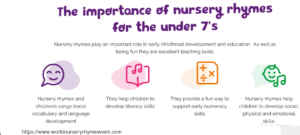
During nursery rhyme week, the children enjoyed reciting and acting out different nursery rhymes.
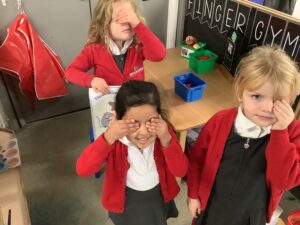

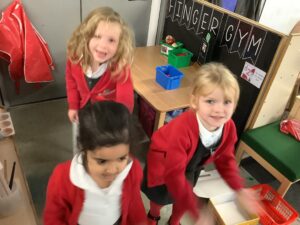
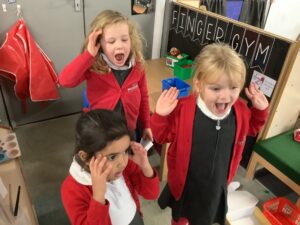
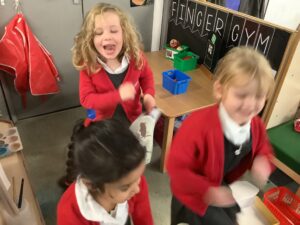


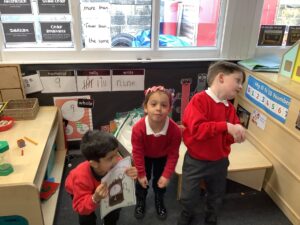
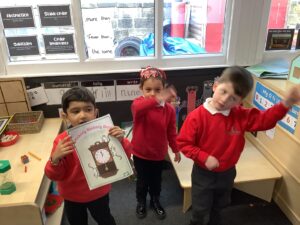
Linked to World Nursery Rhyme Week, we’ve been reading this classic book by Jane and Allan Ahlberg. The children loved listening carefully for the rhyming words and spotting familiar characters on each page.

Class Assembly
With our class assembly quickly approaching (Wednesday 20th November), please remember to practise your speaking parts and refresh your memory by watching the YouTube video of the song we will be singing.
https://www.youtube.com/embed/CMs_IGKxMu0
Reminders
This Tuesday 19 November at 2:40pm is our rearranged class assembly. We hope you can join us.
On Wednesday 20 November, as the whole class are taking part in the infant agility event, the children will need to come to school in PE kit. This will replace our Tuesday PE lesson for next week.
This means, the children should come to school in normal uniform on Tuesday 19 November.
RE Drop Down Morning
This morning, Year 5 had their very first ‘RE drop down morning’. We started off the morning by recapping key vocabulary: theist (a person who believes in God/Gods), atheist (a person who does not believe in the existence of God/Gods) and agnostic (a person who believes that nothing is known or can be known about the existence of God).
Did you know there are nearly 4,000 recognised faiths around the globe? Thankfully, I only asked the children to name the six major religions!

In this RE drop down morning, we focused on the religion of Hinduism. Hinduism is the oldest of the six major religions. It has no single founder. It’s a mix of various beliefs. The children were asked to create a fact file about this religion.

Then, we went on to learn about what Hindus believe. Hindu worship is called puja. Hindus can worship at their holy building, called a mandir, or in their home. The religious leader in a mandir is called a pujari.
Hindus believe in one supreme God, Brahman. Brahman is expressed through different deities. The most important of the deities are called the Trimurti. The Trimurti are the three aspects of the universal supreme God.

Hindus believe in karma and reincarnation; we watched a video which explained what this meant.
In our third and final session, we learnt what festivals do Hindus celebrate. Year 5 found out that Diwali is the five-day Festival of Lights, celebrated by millions of Hindus across the world. Diwali is a festival of new beginnings and the triumph of good over evil and light over darkness, and for some also coincides with harvest and new year celebrations. The festival falls between mid-October and mid-November but changes each year because it is set by the lunar calendar.
The children watched a video explaining the story of Rama and Sita. They then had to order the pictures in chronological order and re-tell the story to the class. The children used their oracy skills of voice projection, eye contact and prosody.


Help at home: Watch the story of Rama and Sita. Discuss the moral message of the story.





